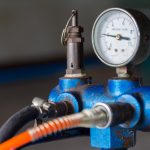 An air compressor is an essential tool in many industries, providing power for various pneumatic tools and equipment. To ensure optimal performance and longevity, proper maintenance is crucial. In this comprehensive guide, we will discuss the key steps to maintain and extend the lifespan of your air compressor.
An air compressor is an essential tool in many industries, providing power for various pneumatic tools and equipment. To ensure optimal performance and longevity, proper maintenance is crucial. In this comprehensive guide, we will discuss the key steps to maintain and extend the lifespan of your air compressor.
1. Regular Inspection and Cleaning
Regular inspections are vital to identify any potential issues or signs of wear and tear. Start by visually inspecting the compressor for any leaks, loose connections, or damaged parts. Look for signs of oil or water accumulation and check the air filters for dirt and debris. Clean or replace filters as needed to prevent clogs and ensure proper airflow.
Additionally, it’s important to clean the compressor regularly to remove any dirt, dust, or debris that may have accumulated. Use a soft brush or compressed air to clean the exterior surfaces and cooling fins. Avoid using harsh chemicals or excessive water, as they may damage sensitive components.
2. Monitor Oil Levels and Change as Needed
Many air compressors require regular oil changes to maintain optimal performance. Check the oil levels frequently, and if it appears dirty or has a milky appearance, it may be time for a change. When changing the oil, make sure to use the manufacturer-recommended oil and follow the specific guidelines for your compressor model.
3. Properly Drain Moisture from Tanks
Air compressors generate moisture during operation, which can lead to corrosion and damage if not properly managed. Most compressors have built-in moisture drains, typically located at the bottom of the tank. Regularly drain the moisture from the tank to prevent water buildup.
To drain the tank, first, ensure that the compressor is turned off and depressurized. Open the drain valve and allow the accumulated moisture to drain completely. It’s recommended to perform this task daily to prevent excessive moisture buildup.
4. Maintain Proper Air Pressure and Avoid Overheating
Operating the air compressor within the recommended pressure range is crucial for its longevity. Avoid exceeding the specified pressure limits, as this can strain the compressor’s components and lead to premature wear. Use a pressure gauge to monitor the air pressure and make adjustments as necessary.
In addition, preventing overheating is essential for avoiding damage to the compressor. Ensure that the compressor is located in a well-ventilated area and that the cooling fins are free from obstructions. If the compressor starts to get excessively hot during operation, allow it to cool down before continuing to use it.
5. Perform Regular Lubrication and Maintenance Tasks
To ensure smooth operation and prevent friction or wear, it’s important to perform regular lubrication and maintenance tasks. Consult the compressor’s manual for specific guidelines on lubrication points and recommended lubricants. Typically, these include lubricating motor bearings, piston rings, and other moving parts.
Regular maintenance tasks such as tightening loose bolts or replacing worn belts should also be performed to prevent further damage and ensure optimal performance. Additionally, keep an eye on the compressor’s vibration levels, as excessive vibrations can indicate a potential issue that needs attention.
6. Seek Professional Service and Repair
Even with proper maintenance, there may come a time when professional servicing or repair is necessary. If you encounter any significant issues or experience a decline in performance, it’s best to consult a qualified technician who specializes in air compressors. They have the expertise to diagnose problems accurately and provide the necessary repairs or replacements.
Conclusion
By following these maintenance guidelines and adopting a proactive approach to caring for your air compressor, you can extend its lifespan and ensure reliable performance for years to come. Remember, regular inspections, cleaning, proper lubrication, and monitoring air pressure and moisture levels are key to maintaining an efficient and durable air compressor.
Got Questions? Let Us Help!
Established in 1932, Wenniger Compressor Co. specializes in air compressors, centrifugal pumps, diaphragm metering pumps, fans, generators, high-pressure air compressors, hoists (all types), lubricated reciprocating air compressors, oil separators, refrigerated air compressor dryers, rotary screw, sliding vane air compressors, submersible pumps, and vacuum pumps. Additional services include rental units, parts, lubricants, rotary screw compressors, service calls, routine maintenance, and much more. Our employees are all licensed to help you make the best decision. Contact us today to schedule an appointment or to get an estimate on the perfect service you need.
